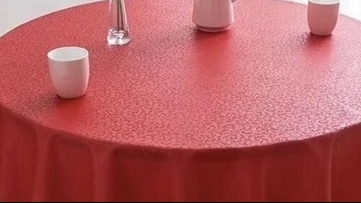<blockquote id="vf288"></blockquote>
為什么有些酒店布草有異味?該如何解決呢?
時間:2024-11-13 來源:http://www.xcnmpx.com/
甲醛殘留 :
Formaldehyde residue:
來源 :一些床上用品在生產(chǎn)過程中使用了含有甲醛的助劑,這些甲醛助劑在紡織過程中難以完全去除,導致產(chǎn)品中含有甲醛殘留。
Source: Some bedding products use formaldehyde containing additives in the production process, which are difficult to completely remove during the textile process, resulting in residual formaldehyde in the product.
危害 :甲醛是一種無色、有強烈刺激氣味的氣體,對人體有害,長時間接觸可能導致皮膚過敏、呼吸道疾病等問題。
Harm: Formaldehyde is a colorless, strongly irritating gas that is harmful to the human body. Prolonged exposure may cause skin allergies, respiratory diseases, and other problems.
解決辦法 :新采購的床上用品應充分洗滌,并在太陽下晾曬較長時間,以有效祛除甲醛。
Solution: Newly purchased bedding should be thoroughly washed and dried in the sun for a long time to effectively remove formaldehyde.
霉味 :
Musty smell:
來源 :
Source:
長期未更換清洗的地毯或布草 :地毯和布草若長期未更換或清洗,容易滋生霉菌,產(chǎn)生霉味。
Carpet or linen that has not been replaced or cleaned for a long time: Carpet and linen that have not been replaced or cleaned for a long time can easily breed mold and produce a moldy smell.
木質(zhì)家具發(fā)霉 :在濕度大的環(huán)境下,木質(zhì)家具容易吸收潮氣并發(fā)霉,尤其是接觸少的角落或背面。
Wood furniture mold: In high humidity environments, wood furniture is prone to absorb moisture and mold, especially in corners or backs with less contact.
墻面滲水 :如果房間內(nèi)有滲水問題,壁紙等覆蓋物會封閉潮氣,為霉菌提供生存環(huán)境。
Wall water seepage: If there is water seepage in the room, wallpaper and other coverings will seal off the moisture and provide a living environment for mold.
解決辦法 :定期更換和清洗地毯及布草,保持房間干燥,及時除霉除濕。
Solution: Regularly replace and clean carpets and linens, keep the room dry, and promptly remove mold and moisture.
洗滌劑問題 :
Detergent issue:
來源 :洗滌劑成分復雜,不同洗滌劑混合使用可能產(chǎn)生化學反應,導致異味。
Source: The ingredients of detergents are complex, and mixing different detergents may cause chemical reactions, leading to odors.
解決辦法 :選擇合適的洗滌劑,并嚴格按照使用說明進行操作,避免混合使用導致的問題。
Solution: Choose the appropriate detergent and strictly follow the instructions to avoid problems caused by mixed use.
布草本身問題 :
The problem with the linen itself:
來源 :某些特殊場所(如醫(yī)院)的布草由于頻繁接觸帶菌物質(zhì),本身可能帶有異味。
Source: Some special places (such as hospitals) may have a strange odor due to frequent contact with bacterial substances.
解決辦法 :對布草進行分類,使用合適的洗滌劑和消毒方法進行處理,以減少異味的產(chǎn)生。
Solution: Classify the linens and use appropriate detergents and disinfection methods to reduce the generation of odors.
工業(yè)洗衣機問題 :
Industrial washing machine issues:
來源 :
Source:
混合洗滌 :不同種類的布草混合洗滌,容易交叉感染,產(chǎn)生異味。
Mixed washing: Mixing different types of linens for washing can easily lead to cross infection and produce odors.

機器衛(wèi)生 :工業(yè)洗衣機若未定期清潔消毒,筒內(nèi)殘留的異味會傳遞給布草。
Machine hygiene: If industrial washing machines are not regularly cleaned and disinfected, the residual odor in the drum will be transmitted to the linen.
解決辦法 :專機專用,定期清潔消毒洗衣機,確保布草洗滌環(huán)境的衛(wèi)生。
Solution: Dedicated for the special machine, regularly clean and disinfect the washing machine to ensure the hygiene of the linen washing environment.
蒸汽問題 :
Steam issue:
來源 :借用他人蒸汽的洗衣房,由于設備陳舊或蒸汽來源不穩(wěn)定,可能導致布草在處理過程中吸附異味。
Source: Laundry rooms that borrow steam from others may cause the linen to absorb odors during processing due to outdated equipment or unstable steam sources.
解決辦法 :確保洗衣房使用獨立的蒸汽設備,并定期檢查和維護,以保證蒸汽質(zhì)量。
Solution: Ensure that the laundry room uses independent steam equipment and regularly inspects and maintains it to ensure steam quality.
助劑和染料 :
Additives and dyes:
來源 :在紡紗及紡織品印染整理中,使用的助劑和染料可能含有石油氣味或芳香烴,這些物質(zhì)在生產(chǎn)過程中難以完全去除,導致異味。
Source: In spinning and textile printing and dyeing finishing, the additives and dyes used may contain petroleum odors or aromatic hydrocarbons, which are difficult to completely remove during the production process, leading to odors.
解決辦法 :選擇環(huán)保型助劑和染料,減少在紡織品中的使用量,以降低異味的產(chǎn)生。
Solution: Choose environmentally friendly additives and dyes to reduce their use in textiles and minimize the generation of odors.
本文由酒店布草進行編寫,想要了解更多的產(chǎn)品及更詳細的精彩內(nèi)容,請關注我們的網(wǎng)站:http://www.xcnmpx.com。
This article is written by Hotel Linen. If you want to learn more about our products and more detailed exciting content, please follow our website: http://www.xcnmpx.com .
資訊推薦Information
聯(lián)系我們Information
